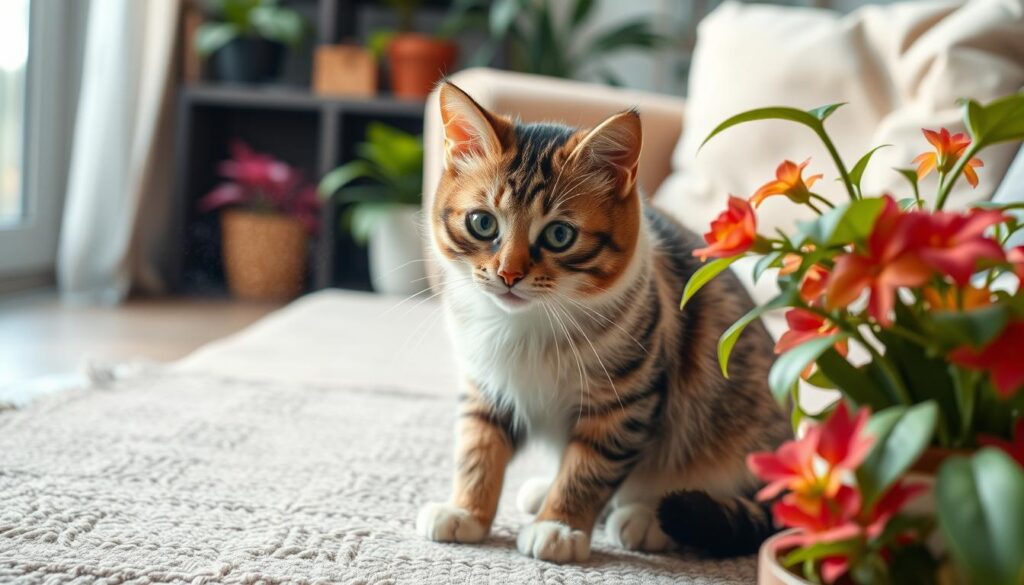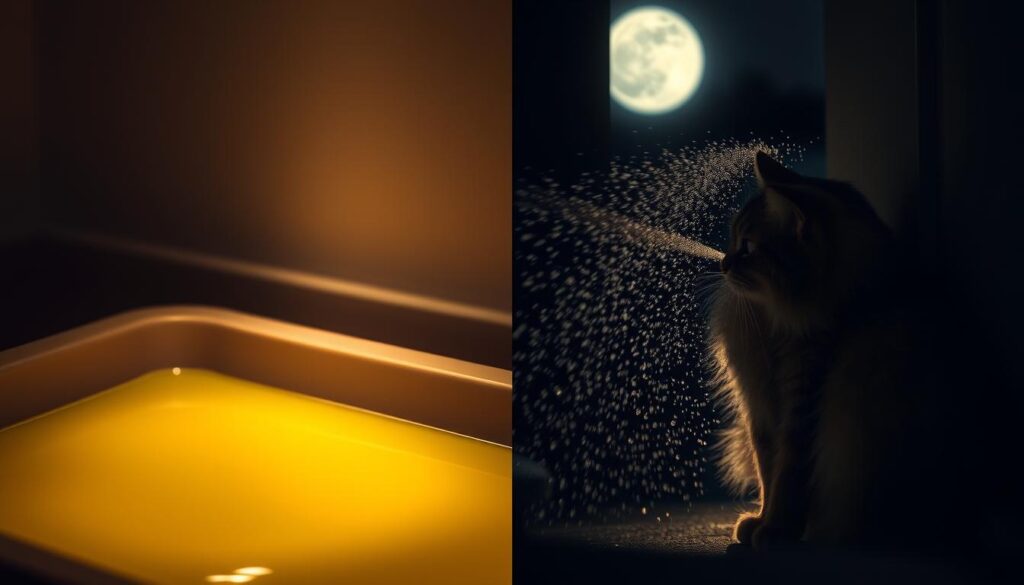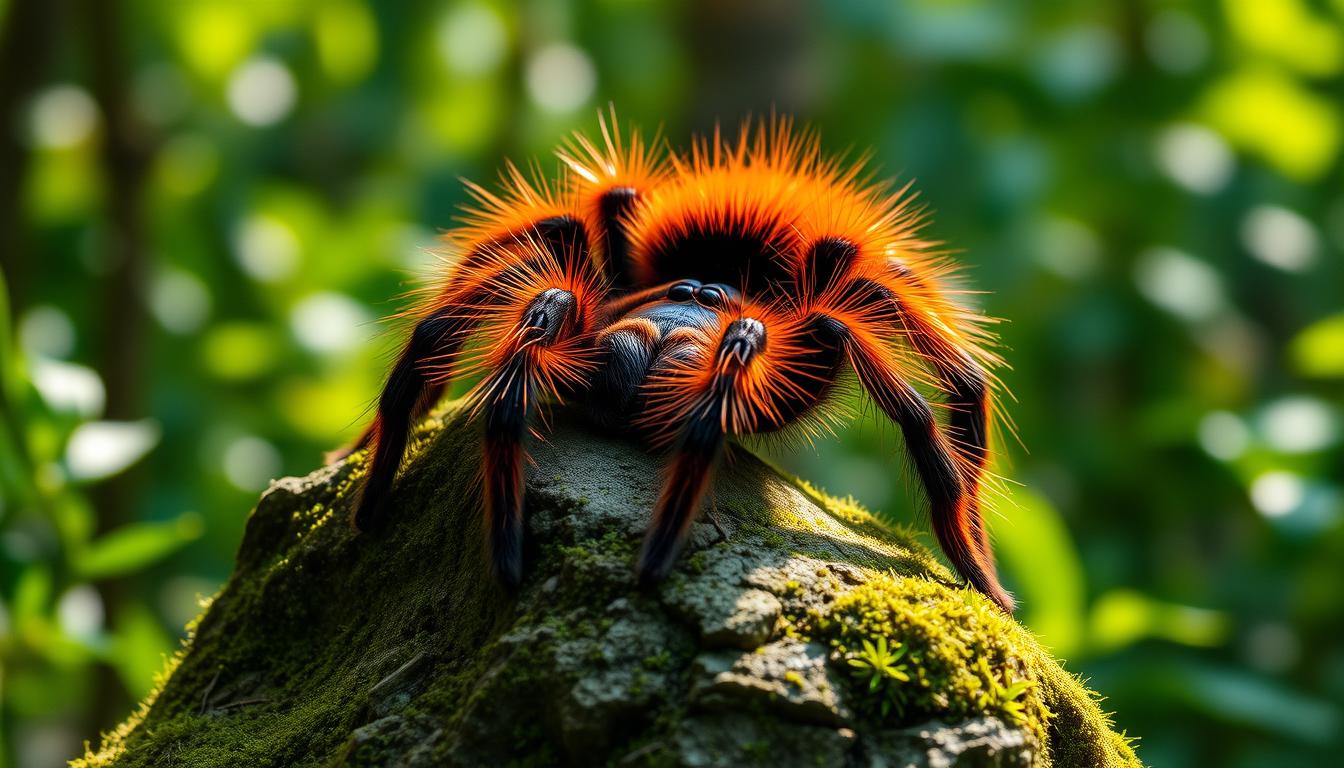What Does Cat Spray Smell Like: Guide to Cat Marking

Did you know nearly 10% of cat owners face issues with their cats spraying? Knowing what cat spray smells like is key to handling this common behavior1. Cat spray has a strong ammonia smell mixed with VOCs, making it smell worse than regular cat urine1. This smell is pungent and musky, leaving a lasting impression that’s stronger than regular cat urine2.
Many pet owners get confused between cat spray and regular cat urine when dealing with cat odor. Spotting this strong smell helps you know when your cat is marking its territory1. If your cat is spraying, knowing this smell helps you clean up and manage the situation better.
Key Takeaways
- Cat spray has a distinctive and intense ammonia-like odor.
- Understanding cat spray is essential for effective behavior management.
- Spraying is a common behavior used by cats to mark territory.
- The aroma of cat spray can linger for extended periods.
- Identifying cat spray can help differentiate it from regular cat urine.
The Distinct Aroma of Cat Spray
The smell of cat spray is very musky and sometimes has a fishy smell. This smell comes from ammonia and other chemicals cats use to talk to each other. Cats can smell things better than humans, which helps them use scent to communicate3.
This strong smell can spread fast, affecting both you and other pets. It makes the air around a cat’s territory smell very strong.
Getting a cat neutered can help stop spraying, but it doesn’t work for everyone. About 10% of neutered males and 5% of spayed females might still spray4. If you don’t clean up, the smell can stay for a long time. It depends on the surface and how well the air moves4.
Stress can make cats spray more. Changes or new things can make them want to mark their territory more3.
Knowing what makes cat spray smell helps us understand how cats mark their territory. Learning about these smells can help you get along better with your cat. It also helps find ways to stop unwanted spraying.
| Factor | Details |
|---|---|
| Duration of Odor | Can last for months or years if not cleaned properly |
| Influence of Neutering | Reduces but does not eliminate spraying chances |
| Stress Factors | Changes in environment can increase marking behavior |
| Cleaning Recommendations | Use enzymatic cleaners like Anti-Icky-Poo to neutralize odor |
| High-Risk Groups | 10% of neutered males, 5% of spayed females may still spray |
By understanding cat spray smell, you can keep your home smelling nice. This makes a better place for both you and your cats34.
What Does Cat Spray Smell Like?
The smell of cat spray is strong and hard to ignore. Knowing what cat spray smells like helps us deal with it better. It’s not just a bad cat pee smell. It’s a mix of smells that are really off-putting.
Characteristics of the Odor
Cat spray smells very bad and is very pungent. People often say it smells musky and fishy, like cat pee. This smell comes from pheromones and other stuff cats release. It’s much stronger than regular cat pee5.
When cats spray, they pee a little, back up, and shake their tail. This makes the smell even more unique5.
Comparison to Regular Cat Urine
Unlike regular cat pee, cat spray is darker and cloudier. It smells much stronger because of extra chemicals and pheromones. If the place isn’t clean, cats might spray more6.
| Characteristic | Cat Spray | Regular Cat Urine |
|---|---|---|
| Color | Darker and cloudier | Lighter and clearer |
| Odor Strength | More pungent and intense | Less intense and more neutral |
| Components | Contains pheromones and other secretions | Primarily urea and water |
| Usage | Mark territory or attract mates | General waste elimination |
Understanding Feline Marking Behavior
Cat marking behavior is key to solving spraying issues. Cats use urine spraying to mark their territory. This helps them define their space and show dominance over others. Both males and females mark, but males do it more due to their territorial nature7.
Stress, changes in the environment, and competition for resources can also make cats mark. This behavior is a way for them to communicate and assert their presence8.
It’s important for pet owners to recognize the signs of cat behavior, especially in homes with multiple cats. When a new cat comes or the environment changes, cats may feel threatened. They might start marking to claim their territory9.
To stop these behaviors, try giving cats vertical spaces like cat towers to reduce stress. Make sure each cat has its own resources and a clean litter box. Using pheromone diffusers can also help8. It’s crucial to create a welcoming home where each cat feels safe and respected.
Why Do Cats Spray?

Understanding why cats spray is key for cat owners. This behavior comes from territorial instincts, social issues, and stress. Knowing these reasons can make your home more peaceful for all pets.
Territorial Marking
Cats spray to mark their territory. This is common in both male and female cats. They do it to show dominance and attract mates. Spaying or neutering greatly reduces spraying1011.
Conflict in Multi-Cat Households
In homes with many cats, spraying is a sign of competition. The more cats, the more spraying, especially with seven or more cats11. It’s important to manage the social dynamics among your pets to stop spraying.
Stress and Environmental Changes
Stress from moving, new pets, or routine changes can make cats spray. They spray as a way to cope with insecurity12. Cleaning where your cat sprayed is key to stop them from coming back1012.
Identifying the Smell of Cat Spray
Finding cat odor can be tough but key for a clean home. Use your senses, especially your nose, to find where the smell comes from. Cat spray often sticks to walls and furniture, so check these spots well.
Using Your Senses
When a cat sprays in a small space, the smell gets stronger. To find these spots, try using UV light. It shows marks that regular cleaning misses. About 10% of neutered males and 5% of spayed females spray, and more in homes with many cats13.
Unneutered males have stronger smells because of their hormones. Clean vertical areas since cats spray there. Cats start spraying at 6 months and may keep doing it due to stress13.Knowing your pet’s behavior helps manage these issues.
Cat Spray vs. Urine: What’s the Difference?

Knowing the difference between cat spray and urine helps you understand your cat better. It lets you address problems more effectively and gives you insight into your cat’s feelings.
Visual Differences
The main difference is how they look. Cat spray is usually found on walls and furniture. This is because cats spray while standing up. On the other hand, urine is found on the floor or in litter boxes.
Spray is smaller and more concentrated than urine. This makes it easier to tell if your cat is spraying or just peeing. It helps you know if your cat is marking territory or just needs to go.
Texture and Volume Comparison
The texture and amount of cat spray and urine also differ. Spray urine is grittier and darker, while regular urine is pale yellow and runny. This difference in look and feel helps you figure out if it’s spray or urine.
If you see signs of spraying, it might mean your cat is marking territory or has an issue that needs attention141516.
Dealing with Cat Spray Odor
It’s important to quickly clean up cat spray to keep your home smelling good. Start by blotting up as much of the spray as you can with a clean cloth or paper towel. Then, clean the area well with cleaners that really get rid of the smell, not just cover it up.
Effective Cleaning Techniques
Choosing the right cleaning methods is crucial to get rid of cat spray smell. Some people use natural cleaners like baking soda because it’s safe and absorbs smells17. About 40% of cat owners prefer natural cleaners over chemical ones, showing they like safer options18.
Enzymatic cleaners are also great for pet smells. They break down the organic compounds in cat urine, effectively removing the smell19. Around 60% of cat owners use these cleaners to get rid of the smell18.
Using Enzymatic Cleaners
For a complete solution to cat spray odor, enzymatic cleaners are the best choice. They dissolve the proteins in cat urine, treating the area thoroughly19. If the smell still lingers, you might need to clean the area a few times, especially on carpets17.
Some cat owners even call in professional cleaners for smells that won’t go away. About 15% of them choose this option18.
Home Remedies for Eliminating Cat Odor
Dealing with cat odor can be tough, but there are ways to fix it. You can use home remedies and professional products to keep your home smelling fresh. Knowing both DIY and professional options helps keep your home smelling good and reduces bad smells.
DIY Cleaning Solutions
Mixing equal parts water and white vinegar is a simple DIY solution. This mix can get rid of the salts in dried cat urine stains, working well on walls and floors20. Adding a few drops of essential oil can make it smell nice. For quick fixes, non-toxic cleaners like baking soda can also get rid of cat spray smells21.
Remember, you might need to clean again, especially on thick carpets, to get rid of all the smell21.
Professional Products to Consider
If DIY solutions don’t work, think about using professional cat cleaning products. Enzyme-based cleaners are the best for getting rid of cat urine smells, making sure they’re gone for good20. These products go deep into surfaces, which is great for things like mattresses and cushions. You might need to use them a few times to get rid of all the smell20.
Don’t use cleaners with ammonia because they can make the problem worse by attracting cats to the same spots20. Always follow the instructions on the product to get the best results.
| Cleaning Method | Effectiveness | Recommended Applications |
|---|---|---|
| Water and Vinegar | Neutralizes odors | As needed for stains |
| Baking Soda | Eliminates cat spray odor | Once after spraying |
| Enzyme-based cleaner | Breaks down odor molecules | Multiple for thick carpets |
| Ammonia-based cleaner | Makes odor worse | Avoid use |
Using a mix of home remedies and professional products can really improve your space2021.
Prevention: How to Stop Cats from Spraying
To manage cat spraying, you need a multi-faceted approach. This means looking at both behavior and environment. Neutering cats can greatly reduce the urge to mark territory. Neutering or spaying your cat is very effective in lowering this instinct and improving behavior. Studies show that about 87% of cats stop spraying after being neutered or spayed22.
Neutering and Spaying
Timing is key when neutering or spaying your cat. This procedure helps control hormones and reduces mating behaviors. For cats that aren’t neutered or spayed, spraying often gets worse, especially when they’re in heat or feel threatened23.
Managing Stress Factors
Reducing cat stress is vital in preventing spraying. Look for stressors like changes in routine, new pets, or loud noises outside. Giving your cat enough playtime, attention, and comfort can help. Amazingly, stress relief can cut down spraying behaviors by a lot23.
Providing Adequate Resources
In homes with multiple cats, it’s important to give each cat their own space. This means separate food and water bowls and litter boxes. Without enough resources, cats may feel anxious and mark territory. Studies show that 60% of cat owners stop spraying by improving resources and using pheromones22. Pheromone-based products can help keep cats calm and prevent future problems.
The Importance of Regular Cleaning
Keeping your living space clean is key, especially with cats around. Regular cleaning helps cut down on bad smells. It makes your home comfortable for you and your pets.
Maintaining a Fresh Environment
Creating a cleaning routine is crucial. Wash litter boxes often and use air purifiers to keep air fresh. This reduces cat smells in your home.
Make sure your home has good air flow to prevent smells from building up. A clean home is good for you and your cat. It also stops cats from marking their territory with bad smells24.
Use enzymatic cleaners like Rocco and Roxie, Angry Orange, and Active’s Enzymatic Cleaner. They target cat urine’s uric acid. This tackles the smell’s source25.
Products like the Pet Deluxe Carpet Cleaner from Bissell work well with oxy-based cleaners. Always test cleaners first to avoid damage. Quick cleaning and gentle blotting are key for removing smells.
For washable items, soak them in diluted urine cleaner overnight. Add some cleaner during washing to remove stains and smells better25. Keeping your home fresh improves its mood and your cat’s health.
Conclusion
Knowing what cat spray smells like is key to managing cat odors. It helps you tackle the problem more effectively. Many cat owners don’t realize that both male and female cats can spray due to hormones. About 10% of neutered males and 5% of spayed females still spray26.
It’s important to figure out why your cat is spraying. It could be because of marking territory, stress, or health issues. Taking steps to prevent these reasons and keeping a clean home can help a lot.
Cleaning your home properly is also crucial. Using enzymatic cleaners can get rid of the smell and stop spraying27. Keeping your cat’s litter box clean and watching their health and behavior is important too.
By paying attention to your cat’s habits and cleaning regularly, you can create a better home. This way, you can manage cat odors and keep your home nice for both you and your pet. For more tips on dealing with this issue, check out here28.
FAQ
What does cat spray smell like?
How can I identify cat odor in my home?
What are effective ways to eliminate cat spray odor?
Why do cats spray?
What are the signs that my cat is stressed and may spray?
Can spaying or neutering help reduce spraying?
What is the difference between cat spray and regular cat urine?
How can I prevent my cat from spraying?
What cleaning techniques are most effective for dealing with cat spray?
How often should I clean the litter box to maintain a fresh environment?
Source Links
- https://www.catster.com/cat-health-care/what-does-cat-spray-smell-like/ – What Does Cat Spray Smell Like? Vet-Reviewed Facts & Behavioral Reasons – Catster
- https://www.catsluvus.com/cat-grooming/what-does-cat-spray-smell-like-identifying-and-eliminating-odors/ – What Does Cat Spray Smell Like? Identifying And Eliminating Odors – Cat Boarding Hotel Laguna, Mission Viejo, Anaheim, Santa Ana, CA | Cats Luv Us
- https://patienceforcats.com/stop-cats-from-spraying/ – Spraying — Why cats do it, and how to stop it.
- https://www.expertcatcare.com/article/what-does-cat-spray-smell-like-and-how-to-get-rid-of-the-odour – How to Get Rid of Cat Spray Smell | Fast, Effective + Easy
- https://www.petmd.com/cat/general-health/cat-spraying-why-cats-do-it-and-how-to-stop-it – Cat Spraying: Why Cats Do It and How to Stop It
- https://modernvet.com/what-does-it-smell-like-when-a-cat-sprays/ – What does it smell like when a cat sprays? — Modern Vet
- https://caringheartsanimalhospital.com/blog/cat-spray-vs-cat-pee/ – Cat Spray vs Cat Pee: What’s the Difference and How to Stop Cats From Spraying in the House | Caring Hearts Animal Hospital
- https://bettervet.com/resources/pet-behavior/urine-marking-in-cats – Understanding and Preventing Urine Marking in Cats | BetterVet
- https://www.ddfl.org/resources/marking-behavior-in-cats/ – Marking Behavior in Cats – Dumb Friends League
- https://www.fetchpet.com/the-dig/do-female-cats-spray – Why do cats spray and can you stop them?
- https://icatcare.org/advice/spraying/ – Spraying | International Cat Care
- https://www.feliway.co.uk/blogs/news/how-to-get-rid-of-a-cat-spraying-smell-6-tips?srsltid=AfmBOoqMECBnWDX4aEjI2872FR1n1scGgi81lONeaSpLx670_2PG-e-m – How To Get Rid Of A Cat Spraying Smell: 6 Tips | FELIWAY
- https://www.greatpetcare.com/cat-behavior/cat-spraying-why-it-happens-and-how-to-stop-it/ – Cat Spraying: Why It Happens and How to Stop It | Great Pet Care
- https://www.catster.com/cat-health-care/cat-spraying-vs-peeing/ – Cat Spraying vs Peeing: Main Differences (With Infographic) – Catster
- https://www.webmd.com/pets/cats/cat-spraying – Urine Marking in Cats
- https://www.preventivevet.com/cats/cat-spraying – Why Cats Spray and Ways to Manage It | Preventive Vet
- https://www.feliway.co.uk/blogs/news/how-to-get-rid-of-a-cat-spraying-smell-6-tips?srsltid=AfmBOooeF5qLBoM9KRVr11N_IeW0JRdiBxOtttZm4cGhYVZdens1JTnm – How To Get Rid Of A Cat Spraying Smell: 6 Tips | FELIWAY
- https://www.wikihow.com/Get-Rid-of-Cat-Spray-Odor – How to Get Rid of Cat Spray Odor: 12 Steps (with Pictures)
- https://www.newsweek.com/why-cat-spray-smells-bad-mystery-solved-1888906 – Mystery over why cat spray smells so bad finally solved
- https://www.petmd.com/cat/general-health/how-to-get-rid-of-cat-pee-smell – How To Get Rid of Cat Pee Smell
- https://www.feliway.co.uk/blogs/news/how-to-get-rid-of-a-cat-spraying-smell-6-tips?srsltid=AfmBOoqW4P-PkIHKivJ6OO7AF2qR8O-dOOWNAIDjCPlF4pPyiVesJt8Y – How To Get Rid Of A Cat Spraying Smell: 6 Tips | FELIWAY
- https://www.feliway.co.uk/blogs/news/how-to-get-rid-of-a-cat-spraying-smell-6-tips?srsltid=AfmBOooP4zwwF1Nhb76qvkhzUPWHIzMEZClum2UNKBFWK9l8xBgqhU8K – How To Get Rid Of A Cat Spraying Smell: 6 Tips | FELIWAY
- https://yourpetandyou.elanco.com/us/behavior/how-do-i-stop-my-cat-from-spraying – How Do I Stop My Cat from Spraying?
- https://catfriendly.com/why-does-my-cat/spraying/ – Spraying | The Cat Community
- https://classactcats.com/blog/cleaning-cat-pee/ – Cleaning Cat Pee: A Guide – Class Act Cats
- https://www.fveap.org/what-does-cat-spray-smell-like/ – What Does Cat Spray Smell Like? Does It Smell Like Poop?
- https://www.perfect-fit.co.uk/cat-advice/me-and-my-pet/how-to-get-rid-of-cat-pee-smell – How to get rid of the cat pee smell from your home?
- https://www.preventivevet.com/cats/how-to-avoid-litter-box-odors-and-messes – How to Reduce and Avoid Litter Box Smells & Messes


